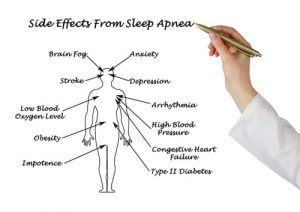 Losing sleep can have a negative impact on our day-to-day lives. Patients with obstructive sleep apnea lose sleep and can also suffer from complications to their overall health. What are the health risks of sleep apnea? How do you know if you need treatment?
Losing sleep can have a negative impact on our day-to-day lives. Patients with obstructive sleep apnea lose sleep and can also suffer from complications to their overall health. What are the health risks of sleep apnea? How do you know if you need treatment?
Frequently Asked Questions About Sleep Apnea Health Risks
Question: What complications can arise as a result of OSA?
Answer: You may be surprised to learn how much a sleep disorder can affect your overall health. For example, over time the disorder can increase the risk of high blood pressure, along with it the risk of stroke and heart attack. In addition, you have a higher chance of developing depression.
Question: How does OSA impact my daily life?
Answer: You may feel exhausted during the day or have trouble concentrating. In addition, you may experience moodiness. If you drive long distances regularly, exhaustion can make the risk of falling asleep behind the wheel greater.
Question: How do I know if I need treatment?
Answer: Common warning signs of sleep apnea may include chronic snoring, episodes of waking up choking or gasping for air, and frequent exhaustion during the day, even if you assume you slept the night before. If these warning signs sound familiar, then give us a call. We can assess your symptoms and see if you require treatment for sleep apnea.
Question: What treatment will the doctor recommend?
Answer: We often recommend an oral appliance. Similar to a nightguard, this custom device is worn while the patient sleeps. The device moves the jaw forward slightly, enough to keep airways open and prevent obstructed breathing. We can also discuss changes to your lifestyle, such as sleeping on your side instead of your back, keeping your room dark and cool, maintaining a regular sleep schedule, and avoiding alcohol and caffeine before bed.






